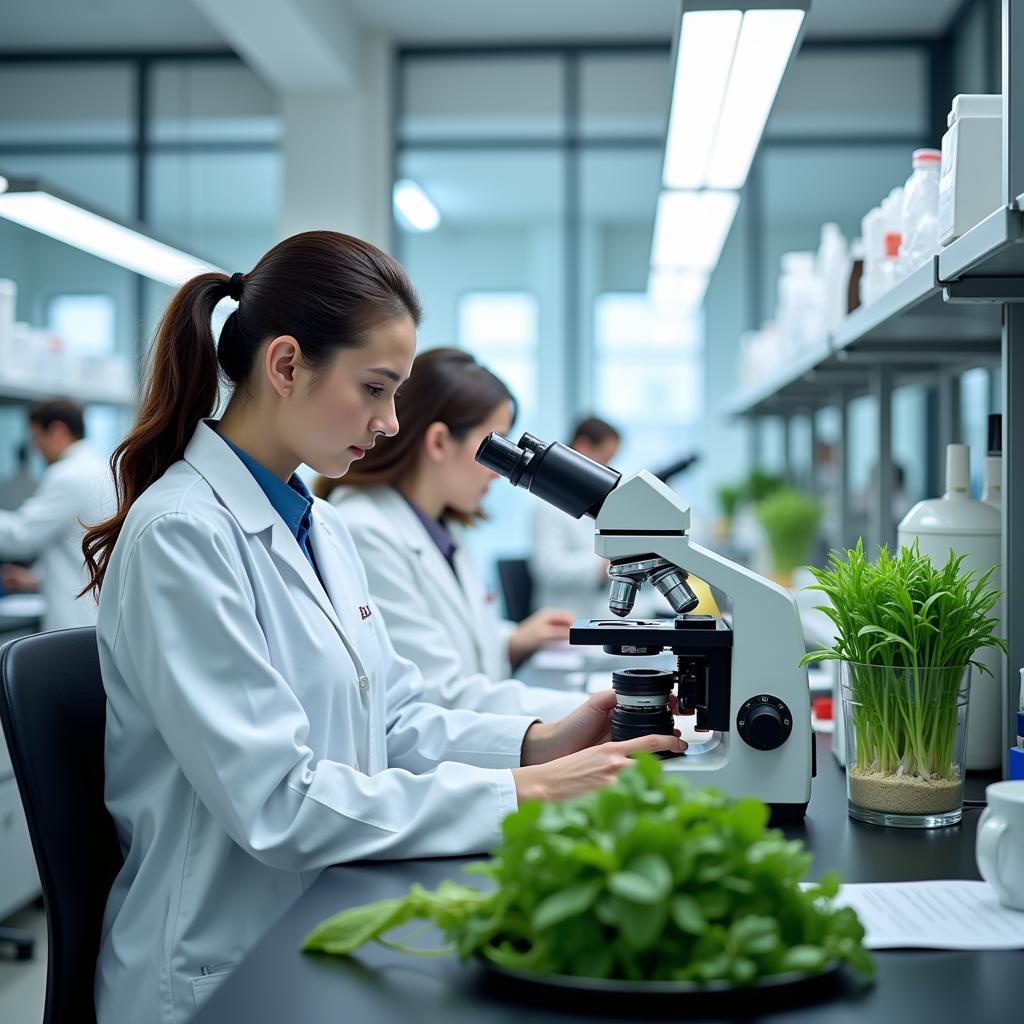The topic of genetic engineering in food production has been increasingly appearing in IELTS Writing Task 2 exams over the past few years. Based on analysis of past exam questions and the effects of genetic engineering on agriculture, this theme is likely to remain relevant given its significance in addressing global food security challenges.

Analysis of Question Types
Common question formats on this topic include:
- Discussing advantages/disadvantages of genetically modified crops
- Evaluating whether genetic engineering should be permitted in food production
- Analyzing the impact on farmers and consumers
- Debating ethical considerations
Let’s examine a frequently appearing question type:
Some people believe that genetic engineering is the solution to world hunger, while others think it poses risks to human health and the environment. Discuss both views and give your opinion.
Band 8 Model Essay
The debate over whether should genetically modified crops be used to solve food scarcity has become increasingly contentious in recent years. While proponents see it as a revolutionary solution to global food insecurity, critics raise valid concerns about its potential risks. In my view, genetic engineering offers significant benefits that outweigh its drawbacks when properly regulated.
Those in favor of genetic engineering argue that it can dramatically increase crop yields and enhance food security. Modified crops can be engineered to resist pests, withstand harsh weather conditions, and provide enhanced nutritional value. For instance, golden rice has been developed to contain additional vitamin A, potentially preventing malnutrition in developing countries. Furthermore, crops can be modified to require less water, making them more resilient to the impact of drought on food production.
However, opponents raise legitimate concerns about potential health and environmental risks. There are fears that genetically modified organisms (GMOs) could cause allergic reactions or have unforeseen long-term health effects. Additionally, there are worries about genetic contamination of non-modified crops and the potential impact on biodiversity. Some critics also argue that should genetically modified crops be encouraged, it could lead to corporate monopolies over food production.
In my opinion, while these concerns deserve attention, genetic engineering’s benefits are too significant to ignore. The key lies in implementing robust regulatory frameworks and continuous scientific monitoring. With proper oversight, we can harness the advantages while minimizing potential risks. Moreover, as climate change threatens traditional agriculture, genetic engineering could become increasingly crucial for ensuring food security.
Band 6.5 Model Essay
Genetic engineering in food production is a controversial topic that affects many people. Some think it can help solve world hunger, while others worry about its safety. This essay will discuss both sides of this issue.
On the positive side, genetic engineering can help produce more food. Scientists can make crops that grow better and don’t get destroyed by insects or bad weather. Also, they can make food more nutritious, like adding vitamins to rice. This helps poor countries where people don’t get enough food or proper nutrition.
However, there are some problems with genetic engineering. Many people worry that eating genetically modified food might not be safe for health. They think it could cause allergies or other health problems. Also, some farmers worry that big companies will control all the seeds, making it expensive for them to grow crops.
In my opinion, genetic engineering can be good if we use it carefully. We need strict rules to make sure it’s safe, and scientists should keep checking for any problems. This way, we can use this technology to help feed more people without causing harm.
Analysis of Band Scores
Band 8 Essay Features:
- Sophisticated vocabulary: “contentious,” “proponents,” “regulatory frameworks”
- Complex sentence structures
- Clear organization with cohesive devices
- Well-developed arguments with specific examples
- Academic tone throughout
Band 6.5 Essay Features:
- Simpler vocabulary and grammar
- Basic organizational structure
- Less detailed examples
- More informal tone in places
- Limited use of complex sentences
Key Vocabulary
- Genetic engineering (n) /dʒəˈnetɪk ˌendʒɪˈnɪərɪŋ/ – The manipulation of an organism’s genes
- Biodiversity (n) /ˌbaɪəʊdaɪˈvɜːsəti/ – Variety of plant and animal life
- Contamination (n) /kənˌtæmɪˈneɪʃən/ – The action of making something impure
- Resilient (adj) /rɪˈzɪliənt/ – Able to withstand difficult conditions
- Monopolies (n) /məˈnɒpəli/ – Complete control of trade in a particular area
Remember to practice writing your own essays on this topic and share them in the comments section for feedback. Future exam questions might focus on specific aspects like the economic impact of genetic engineering or its role in sustainable agriculture.